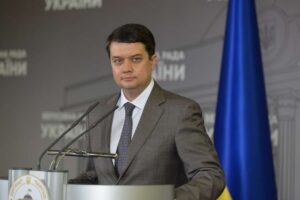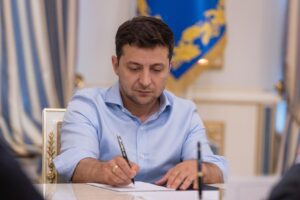
Chairman of the Verkhovna Rada Dmytro Razumkov signed a law on preventing and countering anti-Semitism in Ukraine.
As noted in the card of the relevant bill No. 5109, the speaker signed it on September 29 and handed it over to President Volodymyr Zelensky for signature.
The bill defines anti-Semitism, prohibits anti-Semitism and its manifestations, and provides for liability for violation of anti-Semitism legislation.
According to the document, manifestations of anti-Semitism are, in particular, the call, concealment or justification of killing or harming persons of Jewish origin, giving false information, hateful statements about them, denying the fact of the persecution and mass extermination of Jews during the Second World War (Holocaust), making, distribution of any materials containing anti-Semitic statements, as well as public use of materials, symbols and images of anti-Semitic content.
At the same time, the law includes deliberate damage, destruction or desecration of buildings, other structures belonging to persons of Jewish origin, Jewish communities and public Jewish organizations, as well as religious or religious buildings (houses), burial places of persons of Jewish origin, monuments, as and the public use of materials, symbols and images of anti-Semitic content.
At the same time, the law includes deliberate damage, destruction or desecration of buildings, other structures belonging to persons of Jewish origin, Jewish communities and public Jewish organizations, as well as religious or religious buildings (houses), burial places of persons of Jewish origin, monuments, memorial signs dedicated to Jews, based on anti-Semitism.
Persons guilty of violating the norms of this draft law will incur civil, administrative and criminal liability in accordance with the law, as well as compensation for material damage and moral harm caused as a result of anti-Semitism, its manifestations, will be carried out in the manner determined by the legislation of Ukraine.
This law will come into force the next day after its publication in the parliamentary newspaper Holos Ukrainy (Voice of Ukraine).
As reported, on September 22, the Verkhovna Rada adopted draft law No. 5109 at the second reading and in general.

The Verkhovna Rada of Ukraine adopted at second reading law on amendments to certain Laws of Ukraine concerning the enhancement of the activity of science parks (bill No. 4236), which, in particular, grants the right to universities and scientific institutions to create science parks without the consent of the Education Ministry.
The law was supported by 321 MPs with the required 226 votes.
The law also provides for preferential rental conditions for premises for science parks (UAH 1 per one square meter).
According to it, students, graduate students, researchers and employees of universities and research institutions should be involved in work in such parks.
At the same time, science parks can provide services such as research and development work, financial and economic support of investment (innovation) projects, as well as services for professional communication and harmonization of terminology, development and implementation of marketing strategies.
According to the Education Ministry, there are 36 scientific parks registered in Ukraine, the founders of which are budget institutions, including universities and research institutions.
During the discussion, parliamentarians said that current science parks are not an effective tool for innovation. In particular, due to the complex and lengthy process of creation, as well as the vaguely expressed legal status.

The adoption of a law simplifying the procedure for privatization and lease of state property will be a signal for investors, including international ones, Deputy Head of the Parliamentary Committee on Economic Development Roksolana Pidlasa (Servant of the People faction) said.
“This bill [No. 4572] will become a green light for investors, including international ones. And it will also contribute to the development of regions, because after its adoption, the budgets of communities will receive funds not only from the privatization of municipal enterprises, but also 10% of the funds received from the sale of state assets,” Pidlasa told Interfax-Ukraine.
She recalled that the Verkhovna Rada has already adopted the bill at the first reading and currently the Committee on Economic Development is preparing it for the second reading.
The MP stressed that “it is privatization that gives people the opportunity not to go strawberry-picking in Poland, but to have a decent job in Ukraine, in their community.” “Hundreds of enterprises and production sites that have been abandoned and forgotten for decades and would hardly ever resume work are bought by private investors and they turn them into modern enterprises where Ukrainians are working now,” Pidlasa said.
The MP recalled that over the past year and a half, the State Property Fund returned ten key assets under state control, including the United Mining and Chemical Company, PJSC Centrenergo and JSC Odesa Port-Side Plant.
As reported, the Verkhovna Rada on July 15 adopted at the first reading bill No. 4572 on amendments to the law on the State Property Fund of Ukraine and other legislative acts promoting investment attraction in the process of privatization and lease of state and municipal property.

President of Ukraine Volodymyr Zelensky has signed a law restoring the value added tax (VAT) rate for part of agricultural products from 14% to 20%, the specified tax rate reduction was in effect from March 1, 2021 to July 30, 2021.
According to data on the website of the Verkhovna Rada, the law on amendments to the Tax Code of Ukraine regarding the rate of value added tax in taxation of transactions for the supply of certain types of agricultural products under No. 1600-IX (bill No. 5425-d) was signed on July 29.
According to the data on the website of the President’s Office, the law is intended to reduce the risks from higher food prices, as well as to create equal conditions for VAT taxation for agricultural producers and processing industry enterprises. The document comes into force on July 30 and applies to tax periods starting from August 2021.
As reported, on July 1, 2021, the parliament returned the VAT rate on livestock products, rye, oats, flax seeds and sugar beets to 20% from the previously reduced one 14%.
The 20% rate will again apply to products with economic activity codes 0102 (live cattle), 0103 (live pigs), 0104 10 (live sheep), 0401 (in terms of whole milk), 1002 (rye), 1004 (oats), 1204 00 (flax seeds), 1207 (seeds and fruits of other oilseeds), 1212 91 (sugar beets).
At the same time, with respect to other grains and oilseeds, the VAT rate is 14%. In particular, the matter concerns goods with codes 1001 (wheat and meslin), 1003 (barley), 1005 (corn), 1201 (soybeans), 1205 (rape seeds) and 1206 00 (sunflower seeds).
Earlier, a number of associations and food industry enterprises asked the president to veto bill No. 3656, adopted by the Verkhovna Rada in December 2020 and reducing the VAT rate on some agricultural raw materials to 14%, since its action entails an increase in the cost of food products by 3-4% and a decrease in the profitability of processing enterprises by 50-70%.

The adoption by the Verkhovna Rada of the law, which provides for the reboot of the High Council of Justice (HCJ), will launch a real judicial reform in Ukraine, according to a statement posted on the website of the President’s Office on Wednesday.
According to the statement, relevant bill No. 5068, which was initiated by President of Ukraine Volodymyr Zelensky, provides for steps to ensure the independence of the judicial branch of government, namely the reboot of the HCJ, which is responsible for the selection and dismissal of judges. In the implementation of the judicial reform in Ukraine, the recommendations of Venice Commission’s experts, who provided their opinion on the draft law, were taken into account.
“This is without exaggeration a historic event for Ukraine. During the entire period of independence of our state, no government has carried out a real judicial reform giving nothing but promises. My goal is to restore trust and respect for the court. The servants of Themis will cease to be servants of the President, government, parliament or local authorities,” the President said.
Zelensky said that justice is one of the basic values of Ukrainians, but it cannot be ensured without an independent judiciary. In addition, domestic and foreign investors need a fair trial. The vote for the reform of the High Council of Justice laid the necessary foundation for effective changes in the judiciary.

President of Ukraine Volodymyr Zelensky signed the law On Amendments to the Tax Code of Ukraine regarding the abolition of taxation of income received by non-residents in the form of payments for the production and/or distribution of advertising, and improvement of the taxation procedure for value added tax transactions for the supply of electronic services by non-residents to individuals No. 1525-IX, which the Verkhovna Rada adopted on June 3. The website of the head of state reports that the document defines a special taxation procedure for value added tax of non-resident companies that provide electronic services to persons residing in Ukraine.
“This will allow increasing state budget revenues from VAT. Such taxation rules are already becoming a common practice in foreign countries, for example, in the countries of the European Union, Australia, Belarus, Kazakhstan, and the like,” it said.
It is reported that foreign companies that supply electronic services to Ukrainians will be required to register as value-added tax payers using a simplified procedure through a special electronic service if the total amount from the implementation of the relevant transactions exceeds UAH 1 million per year. Non-residents will fill out simplified statements in electronic form in the state or English language.
At the same time, according to the document, transactions for the supply of distance learning services via the Internet are exempted from VAT if this network is used exclusively as a means of communication between a teacher and a student. Also, transactions on the supply of educational services by access to public educational, scientific and information resources on the Internet from the branches of knowledge and specialties in which the training of applicants for higher education is carried out are exempted from value added tax, if their implementation and provision does not require human participation.
From January 1, 2022, Ukrainian companies which pay for services for the production or distribution of advertising abroad, will be exempted from VAT.